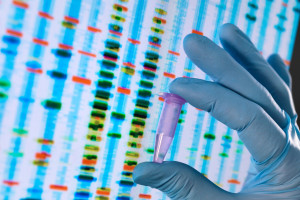Finally a breakthrough? Doctors and patients have long wanted this change in diagnostics

- Experts have long advocated the possibility of performing outpatient genetic testing in patients with BRCA-dependent cancers.
- Currently, consultation is underway on the draft regulation of the President of the National Health Fund regarding the terms of contracts for hospital treatment and highly specialized services.
- The project provides for the possibility of settling complex genetic tests using the NGS method and removes the limitation on the number of amplicons
- BRCA1 and BRCA2 testing will be funded regardless of whether a patient qualifies for the drug program
The possibility of performing genetic tests from peripheral blood in patients with BRCA-dependent cancers on an outpatient basis, without the need for hospitalization , has long been a postulate of the expert community and patient organizations. As experts note, the current structure of settlements makes it impossible to finance outpatient tests, which is why facilities are forced to provide one-day hospitalizations. This engages staff who are in short supply and distracts them from other tasks, and also causes additional costs for the system related to unnecessary hospitalization.
During the conference of the Polish Coalition for Personalised Medicine, Deputy Minister of Health Urszula Demkow announced that this will be possible from 1 July 2025, and the financing will include, among others, testing for BRCA1/2 mutations, i.e. genes key in the diagnosis of ovarian, breast, prostate and pancreatic cancer.
Currently, consultations are underway on the draft regulation of the President of the National Health Fund amending the regulation on specifying the conditions for concluding and implementing contracts for hospital treatment and hospital treatment – highly specialised services, which concerns this issue.
What does the payer propose?As reported by Rynek Zdrowia, the project published on the Fund's website on June 16 of this year shows that advanced genetic diagnostics, i.e. performing tests for BRCA 1/2 mutations using the next-generation sequencing (NGS) method, will still require the patient to be admitted to hospital. The possibility of performing these tests under AOS would only apply to tests from the basic and complex test baskets, but does not include the advanced test basket, which includes NGS.
Additionally, these tests could be performed on an outpatient basis only in the case of qualification for one of the four drug programs dedicated to patients with BRCA-dependent cancers: breast, ovarian, pancreatic or prostate cancer.
Another issue that draws attention in the draft regulation is the payer's proposed method of settling basic and complex peripheral blood tests for BRCA 1/2 in outpatient mode. As it results from the draft, these tests would be reimbursed only for patients in whom the mutation has been confirmed and who additionally meet all other criteria for qualifying for the drug program.
The National Health Fund explains- The draft regulation presented for consultation was prepared based on expert proposals concerning the possibility of settling mutation tests in the BRCA1, BRCA2 genes in BRCA-dependent cancers in an outpatient setting, as part of a hospital contract. This was the wording of the deregulation proposal and this change is included in the draft regulation - informs Paweł Florek , director of the Office of Social Communication and Promotion of the National Health Fund, in the Fund's position.
As he explains, the regulation presented for consultation assumes the possibility of settling complex genetic tests using the NGS method. In the final content of the regulation, the upper limit of amplicons will be lifted, which will enable settling tests in the BRCA1, BRCA2 genes as part of complex tests.
- I will also add that the draft regulation expands the possibility of performing and settling genetic tests for BRCA-dependent cancers, in the manner described above, in patients with biliary tract malignancy - he points out.
As we read in the position, the draft regulation provides for financing of the above-mentioned tests in a situation where such diagnostics are needed for the patient's therapy, i.e., qualification for the appropriate drug program, in accordance with the experts' proposal. These tests will be financed both in the situation of qualifying the patient for such a program, but also when the patient does not qualify for participation in this program .
- I must point out that allowing for the settlement of mutation tests in the BRCA1, BRCA2 genes as part of basic and complex genetic tests, valued at approximately PLN 1.1 and 2.3 thousand, respectively, is dictated by the cost of these tests. Commercial prices of these tests (analysis of mutations in the BRCA1, BRCA2 genes using the NGS method from blood) oscillate around PLN 2 thousand. It is therefore difficult to justify financing this test as part of an advanced test, which is valued at over PLN 4.2 thousand - emphasizes Director Florek.
- It is worth noting that it is currently possible to perform these services under contracts for separately contracted services (in an outpatient mode). Therefore, performing the indicated tests does not require hospitalization, because they can be settled as part of separately contracted services. On the other hand, the changes presented in the draft regulation expand the availability of tests by allowing them to be settled also in an outpatient mode, but from a hospital contract - he adds.
rynekzdrowia












